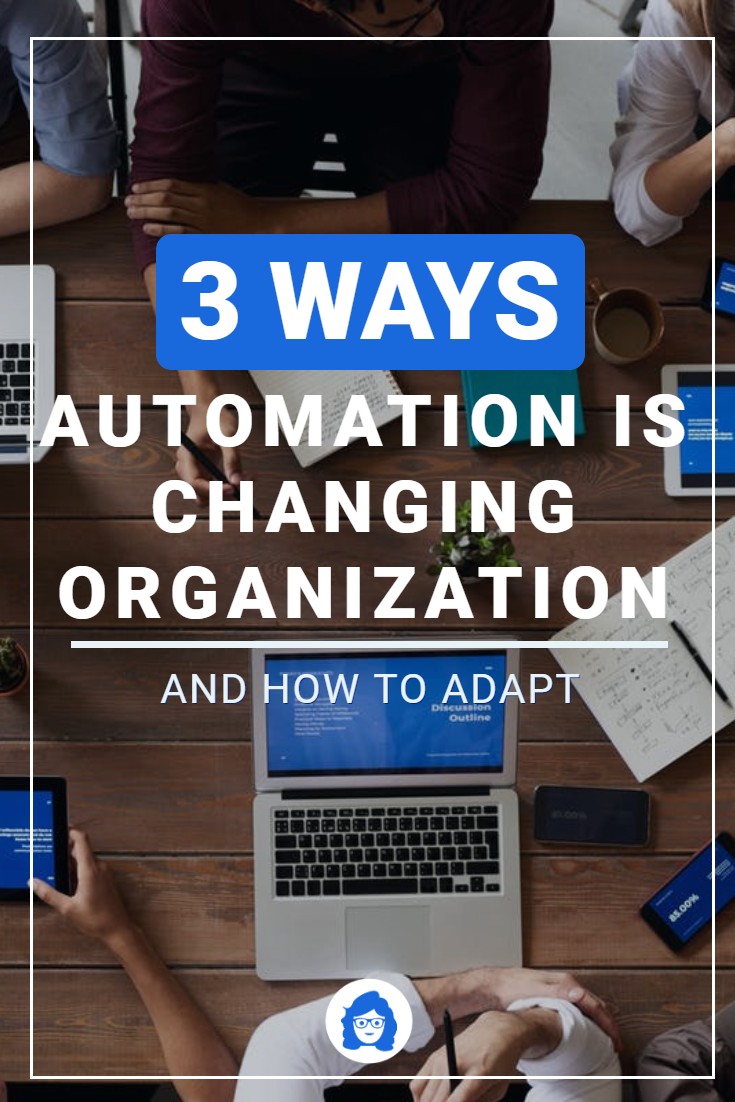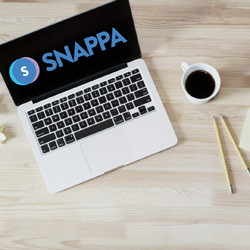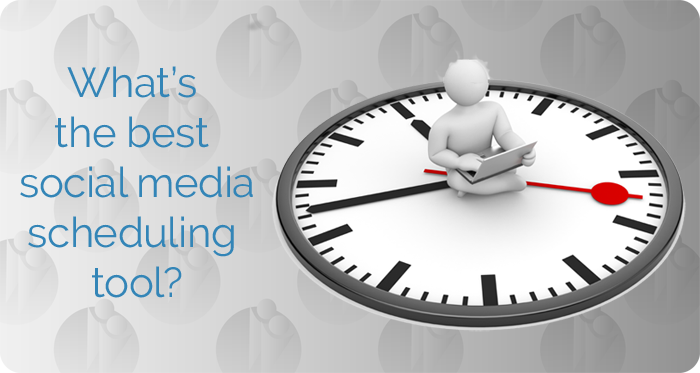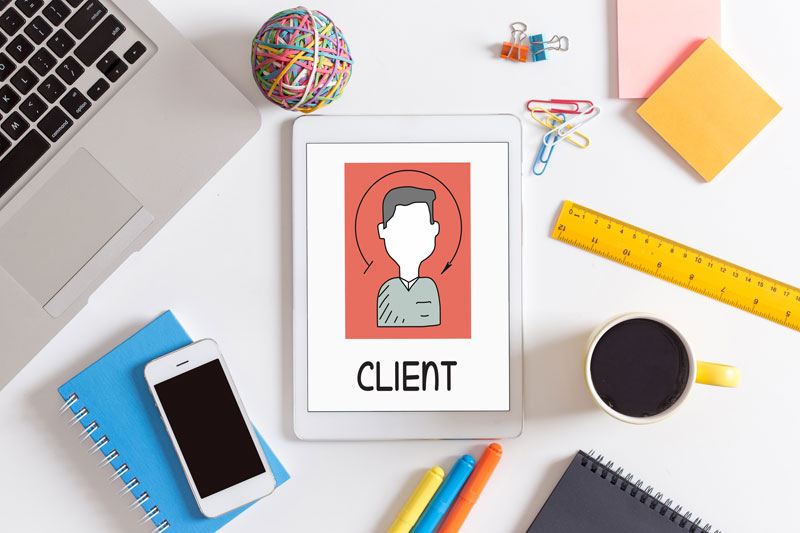3 Ways Automation is Changing Organization, and How to Adapt

This page may contain links to Amazon.com or other sites from which I may receive commission on purchases you make after clicking on such links. Read my full Disclosure Policy
Automation is changing almost everything about how we work — and that includes how we keep ourselves organized.
Even elite consultants are at risk for being replaced by automation if they don’t adapt to the changing workplace.
Productivity and organization consultants will need to know how automation is changing organization in order to properly help their clients stay organized and productive. Here are three ways that automation is changing organization, and how you can adapt.
1. Our Tools (and Clutter) Are Digital
Automation is radically changing how we get work done. With today’s automation technology, around 50% of all work can be automated. But while some jobs are at risk for being completely replaced by robots, in many fields, automation has become a complement to workers, rather than their successor.
As a result, essential tasks are more likely than ever to be completed on the computer, and many companies are going entirely paperless — meaning that office clutter is more likely to be on computers and cloud servers than in desk drawers and filing cabinets.
If you haven’t already, learn about how to keep computers organized, and the different ways to automate basic clean-up tasks, like defragmentation, cloud back-ups and the deletion of older files.
It also wouldn’t hurt to pick up related computer skills, like advanced keyboard shortcuts and other productivity-saving techniques that you can pass on to clients.
2. New Technology Has Changed Our Workplaces
Combine the automation of rote tasks with the rise of better telecommunications technology, and it becomes more possible than ever to work from home. More and more employees are jumping at the chance to work remotely, but the new environment comes with new distractions, and new organizational challenges.
Offices have transformed significantly over the past few years, and they’re likely to change even more in the future. New work arrangements, like coworking, have employees and freelancers learning to share their workplaces with strangers.
And digital nomads, a new class of worker that works entirely from their computer and travel the world, are having to learn to set boundaries and stay productive when their personal life and work life both occupy the exact same space.
Consultants need to be prepared for people who have a strong work-life balance and, at the same time, those with a very porous boundary between life and work. Productivity and organizational consultants will need to learn how to encourage healthy habits, show how to keep home offices organized and how workers can stay productive when their office is always on the move.
3. We Have New Distractions
Automated emails, instant messages and phone calls relentlessly demand our attention all throughout the day. Automation may make an organization consultant’s job harder in some ways, but it also creates new distractions that a lot that workers will need help with.
The average worker spends a massive one-third of their day checking their email — and that goes up to 50 percent if they’re working from home. At the same time, other distractions like social media and work chats vie for our attention, distracting us from our real work. These distractions may be short — a few seconds here, a minute there — but they can seriously damage our productivity. It can take nearly 30 minutes to recover after being distracted, even if the distraction was extremely brief.
As a consultant, you can learn more about email organization and management, as well as productivity tips and methods that workers can use to stay focused and organized at a workplace that is more connected and automated than ever before.
Adapting to an Automated Workplace
Automation is changing almost everything about how we work — like how we communicate, what tasks we complete and how we stay organized and productive.
If they want to stay valuable to clients, productivity and organization consultants will need to know how automation is changing organization, in order to get the most out of these technologies and to be able to offer the best advice about these technologies to their clients.
Consultants will need to adapt to the challenges faced by new kinds of workers — like those that work primarily from home or a coworking space, or those that have become digital nomads. They will also need to learn how to work with new technologies and help workers deal with new workplace distractions. If successful, organization consultants will be able provide a service that no AI can.
Did you find this post helpful?
Share it with your network, and sign up to get new posts by email every week!












I love the term “Digital Nomad,” and I know a couple of these. One the one hand, it is such a luxury. On the other, it does make balancing work and the rest of your life challenging. It takes discipline and structure. The ability to work remotely one day a week is a great trend, though. It definitely allows us to work smart, instead of being boxed into a fixed schedule. One downside has been that older kids and workers no longer get “snow days,” they just become “work from home” days. Alas, we can’t have it all, right?
I have a local colleague who is doing just that! Her house is available for rent via Airbnb, and she and her husband are traveling across Canada and the US in an RV for about 9 months, working along the way. It’s not for me but it’s wonderful that people have such options!
In the past 27 years that I’ve been an organizer, I’ve definitely noticed a trend, especially among the younger generations that there is less paper. Yet with the less paper, there are MORE distractions and interruptions of daily work and personal life. Boundaries were always something that we needed to work on, but with the 24/7 access to us, the need for boundaries has become essential. Digitial organizing has become a specialty within the organizing industry. As we know, paper and digital clutter are just one area that organizers help clients with. There are many more specialties such as chronic disorganization, moving, working with students or elders, or productivity.
When I was an organizer, I liked working with paper the best. I guess I’d be exploring other options, if I hadn’t already made a transition!
Boundaries can definitely be a challenge these days. Sometimes we need to communicate with our clients that having access to us via text, FB Messenger, etc. doesn’t mean we are necessarily going to be reply during off hours.
New distractions have certainly made for more checking on phone, checking for new email, scrolling on Facebook, etc. I feel like I have to make such an effort to just allow myself to be, to think or even to read a book anymore. One of my goals this year is to just go for walks without being attached to my phone. Digital clutter is an interesting term. I find that going through emails and reading what I want to read, discarding some, unsubscribing takes up so much time. I can really go down that rabbit hole, end up subscribing to something new ugh!! Boundaries are so important in this new age.
Those are real challenges, Kim. Technology has given us new expectations. For example, when I read an ebook, I like to tap on unfamiliar words to read the definition. Although I prefer printed books, I miss that feature, so I will occasionally pick up my phone to look up a word. It takes a lot of self-discipline to ignore notifications too!
Because I work with small business owners, I do find that keeping people motivated and on track has become my main asset to them. Small Business Owners can easily forget tasks, so I have adapted to make specific tasks they need to keep track of are also on my to-do list. This adds value to them and their business, resulting in the increased recurring business.
Also, I can relate to Nomads. Ninety percent of the time, I communicate through my computer with clients and others. I treasure the times when I can meet with clients every few weeks. It helps them stay on track and take action. Automation does help when you can use it, but not for all industries and all small business owners.
Now that you mention it, I can’t remember the last time I met with a client in person – not counting friends and family of course. It’s always great to make that face-to-face connection.
I often work with clients who work from home, helping to organize their home offices. Your points about digital clutter, and the fact that so many new distractions can damage productivity is so true! So many of my discussions with home office organizing clients are about ways to eliminate distractions in this environment.
I can imagine – those stats are pretty alarming!
In addition to helping our organizing clients overcome the challenges of learning new digital tools, coping with increased distractions, etc., modern technology also gives us opportunity to work with others virtually while staying put….kind of the flip side of being a Digital Nomad!
Along with digital nomad, I like the terms digital native (those folks born a decade or so after I came into the world) and digital immigrants (people my age and older, perhaps much older, for whom everything is a bit more of a struggle). All of us will increasingly have to deal with the Internet of Things (IoT), everything from telling our Alexa to play some music to programmable thermostats to whole houses we can control from a distance. If we think our phones are wonky when something goes awry, imagine Grandma trying to deal with weirdness when she’s shivering because the thermostat won’t respond to her commands. We’ve got a lot to learn…and teach!
Those are both new terms to me, Julie – thanks! And I think of myself as pretty tech savvy, but I know zip about IoT.
I’m gradually shifting to more automation in my business – and things have definitely changed since I first started. All of my client notes are in Evernote, my contracts are sent digitally for e-signature, and I’ve started incorporating scheduling software into my routine. I also started using a coworking space, which I find really helpful for my productivity. That said, I do look back wistfully sometimes at the giant stack of legal pads in my office closet that have all sorts of notes and reminders. Most of my clients have a ways to go with incorporating more automation, but I think it’s most important for them to figure out what actually works – regardless of the level of tech. Lots of people get caught up in the system without considering what it is supposed to do for them.
I hear you, Sara! I do many of those things as well – including remembering fondly the days when everything I did was recorded in notebooks that I could refer back to as needed.
As a lover of technology, I’m all too aware that it can be a double-edged sword. It can help us be incredibly focused AND distracted. Being mindful of the push and pull of tech and having a purpose for using it can help. I hate to say this, but there’s an app for that! Yes, our tech can help us not get too involved with our tech (very meta LOL ?).
My biggest pet peeve is when I log onto Facebook for a work purpose, check out my notifications and whatever else catches my eye, remember I’m supposed to be working, and log off again – without doing what I went there to do.
Online communication is the new normal for organizations to meet and keep plans/documents share among members. Something that boosts the communication but still not enough when tackling sensitive information and discussions you can’t really read one’s facial reaction without sitting face to face.
That’s a good point, Drawtite. Many a text or email has led to problems when the message was taken the wrong way.